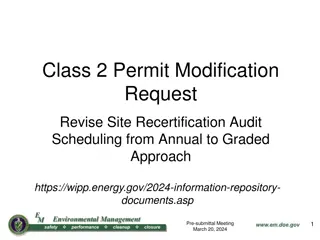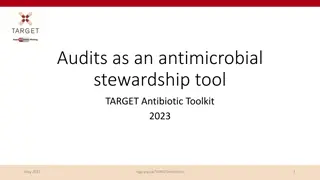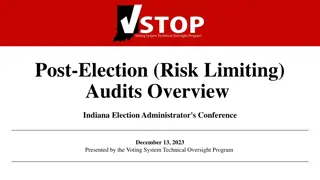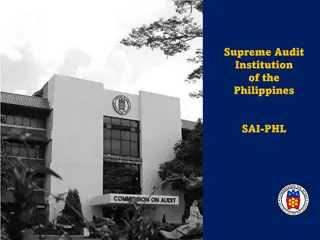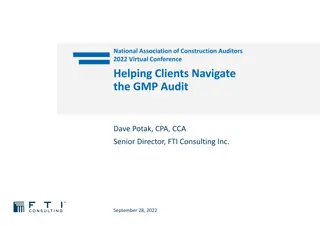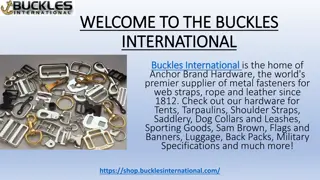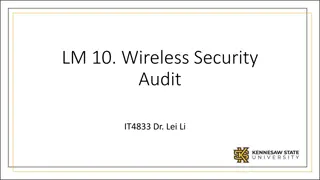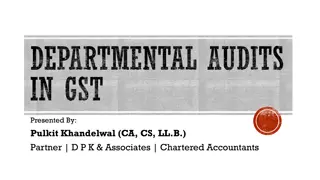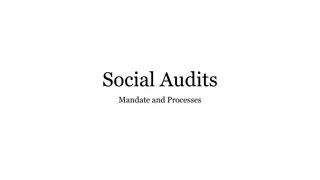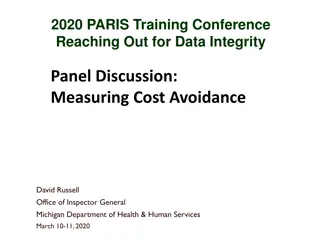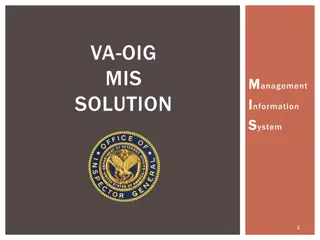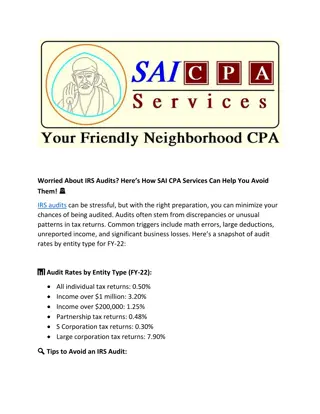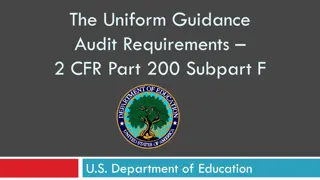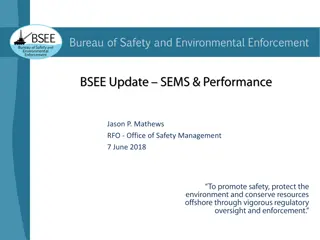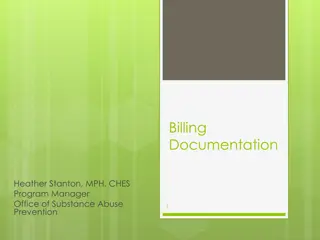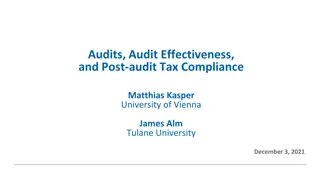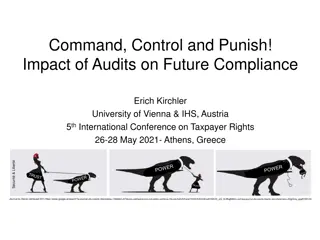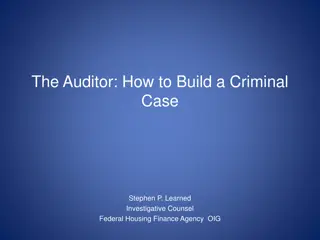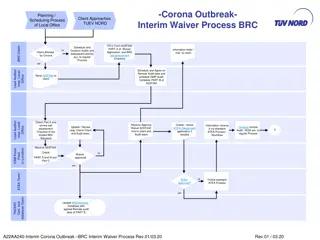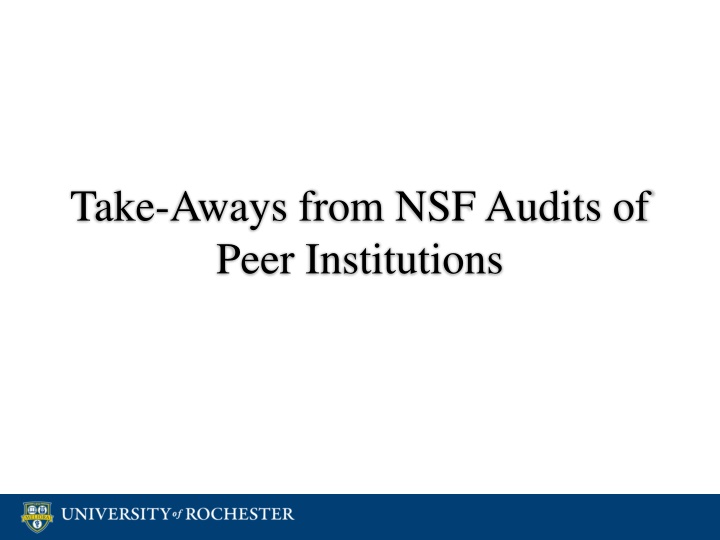
Insights from NSF Audits of Peer Institutions
Discover key takeaways from NSF audits conducted on peer institutions including types of audit findings such as unallowable expenses in travel, consultant costs, visa expenses, and more. Learn from real examples of disallowed expenses and gain valuable insights to improve financial compliance in academic settings.
Download Presentation

Please find below an Image/Link to download the presentation.
The content on the website is provided AS IS for your information and personal use only. It may not be sold, licensed, or shared on other websites without obtaining consent from the author. If you encounter any issues during the download, it is possible that the publisher has removed the file from their server.
You are allowed to download the files provided on this website for personal or commercial use, subject to the condition that they are used lawfully. All files are the property of their respective owners.
The content on the website is provided AS IS for your information and personal use only. It may not be sold, licensed, or shared on other websites without obtaining consent from the author.
E N D
Presentation Transcript
Take-Aways from NSF Audits of Peer Institutions
Who Was Audited? Rensselaer Polytechnic Institute University of Vermont University of Arkansas North Dakota State University Mississippi State University University of New Hampshire Montana State University University of Oklahoma University of Alabama Brown University Iowa State University March 2023 October 2023 November 2023 November 2023 January 2024 January 2024 January 2024 March 2024 May 2024 August 2024 August 2024
Types of Audit Findings Unallowable Expenses Travel Consultant Visa Expense Publication Expenses Allocations Supplies and materials Travel Subcontracts Participant Support Costs
Unallowable Expenses - Travel Flight purchased 8/8/XX to attend a conference on 8/9/XX. Conference registration was completed on 7/20/XX. Airfare was $500 more expensive than if flight was purchased earlier (i.e., 7/20/XX). $500 was disallowed upon audit. $250 payment for an early departure fee was disallowed upon audit.
Unallowable Expenses - Travel Principal Investigator charged award for $1,600 in airfare. The first part of the trip was to attend a conference that benefitted the project. The second part of the trip was personal travel. The institution did not provide a cost comparison (or any documentation) to prove that the award did not incur a greater airfare cost as a result of the personal travel component.
Unallowable Expenses - Travel Principal Investigator charged an award for $950 of hotel costs to enable her to stay one additional day after a conference. Although six of the seven travel days benefitted the award, the additional day was spent collaborating with industry partners on other, unrelated projects.
Unallowable Expenses - Travel Principal Investigator charged an award for one day s lodging costs that were ultimately refunded (since the Principal Investigator left the conference one day earlier than originally anticipated). Principal Investigator charged an award for the registration fee of an accompanying person; however, the accompanying person did not expend effort on the project.
Unallowable Expenses - Travel Principal Investigator charged an award for upgrade to Comfort Plus seating without documenting that a special accommodation existed that would make the upgrade allowable. Principal Investigator charged an award for the airfare to attend a conference, but did not attend because of becoming ill. The airfare was deemed unallowable because ultimately the project did not benefit.
Unallowable Expenses - Consultant In July 20XX, the institution charged the award $3,700 in expenses for consulting services. There was not a consulting agreement that identified the scope of services provided or that the fee was reasonable. In December 20XX, the institution charged the award $57,750 in consultant services without completion of the contractor-versus-employee form, completion of a sole source justification form, or an executed contract between the institution and the contractor.
Unallowable Expenses Visa Expense The institution charged $3,500 to the award for a long-term visa of a post-doctoral research scientist. Although the person did work on the project, the long-term visa expense and premium processing fee are not allowed.
Unallowable Expenses Publication Expenses The institution charged $35,300 in expenses incurred to publish 11 research papers that did not acknowledge the NSF awards charged, as required by federal regulations. As a result, the $35,300 was reversed from the projects as a result of the audit.
Allocations Supplies and Materials Materials were purchased 51 days prior to an award s end date, but were 100% charged to the project. The materials were to benefit three awards, not this single award. 66.67% of the material cost was disallowed for this project, upon audit.
Subcontracts Fixed Price Approval $1,274,000 was paid to a subcontractor as a fixed price award. NSF did not specifically approve the fixed amount subaward. The amount above the $150,000 threshold (whereby fixed subawards would need prior NSF approval) was disallowed. The University was required to reverse $1,124,000 from the NSF project.
Subcontracts Documented Risk Assessment $62,000 and $1,086,000 were paid to two subcontractors, but the University did not prepare a risk assessment (e.g., reviewing audit findings of the subcontractor), therefore did not determine the proper amount of subawardee monitoring. The University was required to reverse both amounts ($1,148,000) from both awards.
Participant Support Costs $4,800 in participant support funding was used to pay compensation to one of the institution s own postdoctoral students. The postdoctoral student does not satisfy the definition of a participant . $1,900 in participant funding was used to pay no-show participant lodging expenses. The project was deemed NOT to have benefitted from the $1,900.
Participant Support Costs $4,600 in participant support funding was used to pay the lodging and meals of persons from the institution who were serving as counselors and mentors of the participants. The institution s employees fulfilling the counselor/mentor roles do not satisfy the definition of participant .
Thank you Questions?


